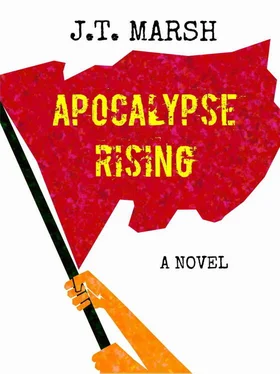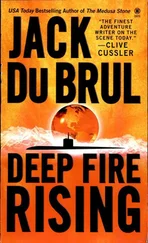They don’t speak that night, and it’s only from the way she’s glanced at him a half-second too long that he knows she’s a young vixen who may enjoy the playing of games rather than the joy of a sincere companion. After their first night together, she stands at the open window in his little working-class apartment and casts a look over the alley running behind the building. In the night, they talk, about life, about love, something in this young woman moving Valeri to bare himself to her in ways he’d never bared himself to anyone. And she, in turn, reveals herself in kind, in the night all laid out for either to see. As distant gunfire rattles into the night, the fires of liberation burn, and in those fires there burns the essence of the working man’s need for a release from this prison he’s trapped in. Already on course with the rest of his life, in time Valeri will come to make himself one with the apocalypse already rising in the streets.
Turning against one another, Valeri and Sydney take in the sight of the darkened night’s sky turns a dull, faded amber by the fires in the streets, sharing an embrace before parting ways. If what Sydney has told Valeri is true, then she will prove to be a righteous ally in the war for dignity and compassion, for liberation and intimidation. For, you see, when they were sitting on that little nook behind the window overlooking the alley, she had turned to him and, in the kind of hushed voice that indicated she was unsure not of him but of herself, said, “I love you.” And he, almost reflexively, turned back and said, “I love you.” At that moment she’d crossed over and fully embraced his way of life, in spirit if not in form. Still in the twilight of his youth, Valeri has the advantage of recalling the idealistic passion of his younger years yet able to look ahead with pragmatism to see the way through to a future better for all. Now, the challenge facing Valeri and all the other working men in Britain is the simplest yet most difficult any have ever faced: rise!
In the morning after Valeri and Sydney have each other for the first time, he visits the cemetery where his parents were buried after dying in the failed uprising fifteen years ago. Not far from the apartment block where Valeri lives, they’re buried in a small plot with a simple headstone. Every year for the past ten years he’s visited, but only on this very day in the early summer. This time, he kneels on the ground before their headstone, then places a lily upright against it. Many different kinds of people died on the day they died, mothers, fathers, children, brothers, sisters, all cut from the same cloth as his parents. Valeri stands, and before he leaves he says, “I’ll make you proud.”
Life in London’s working class districts is never easy, and since the failed rising fifteen years ago it’s only become harder for all. Around the city and across the country, the life which had once so dominated every minute of every day has all but ceased, its place taken by a muted despair. Where once the wealthy man had stored his ill-gotten wealth in the form of a mad rush to build, build, build, now he stashes it away in secret holdings, inaccessible to all but the most intrepid of inquisitors, hiding behind assumed names and front after front, only hoarding what never belonged to him for so long as he believes it’s absolutely necessary. Inevitably, he’ll make a mistake, he’ll let slip some key piece of information to exactly the wrong person, his scandal soon to flash across the screens of millions of the working man’s own. And when that moment comes, the rebel immediately seizes on it, pointing to the wealthy man’s stashing of wealth and voracious appetite for his own profit even as the world’s falling apart around us all. But then, nothing will happen, nothing apparent to the public eye. It’s as though the wealthy man’s ashamed of his corruption, compelled by his self-consciousness to hide his true character even as the better part of him fully understands all can see it anyways. As for the working man’s own concerns, he might be forgiven for looking ahead and seeing only still more bare cupboards and empty stores, but this time, this time he looks back and wonders where this long and confusing path has led him, never more assured of his own denial. Like all working men, Valeri is consumed in surviving from day to day; but like all working men, he dreams himself close to the day when he’ll have his chance to strike back. Too consumed he is with his own day to day survival to see his chance is sooner than he thinks.
Despite the unrest and all the hardships that’ve come about since the failed rising fifteen years ago, London and all the other cities in Britain have seen much change. Finding work here, finding work there, the working man sees only the way from one day through to the next fraught with peril, with broken bodies and with broken minds. Sometimes, as he’s working through the day, each muscle smoothly contracting and expanding a thousand times over like the hydraulics of the machines he operates, he wonders if it’s all been worth it, an insidious, corrosive line of thought, he knows, that can only take him into a place of deeper, darker suffering than ever before. No, as the working man finds just enough work to keep a roof over his head and food on his table, he comes to realize he owes it not only to himself but to his children, and their children, and their children as well to push through this hardship, this poverty of values and of vice so as to provide for them in the future what he could never provide for them now: a new beginning, a better tomorrow, a world in which they will never have to fear eviction from their own homes, a world in which they will claim as theirs a dignity never before afforded to them, a world in which the last vestiges of the wealthy man’s excess will have been long ago purged. In surviving for so long as he has, Valeri has learned working men like him must earn everything they have, must fight for every scrap of meat and for every thread of clothing on his back. For him, it’s been this way for as long as he can remember, but there’s a better way.
But there’s trouble afoot which’ll awaken in him an instinct. Our history is replete with examples of men like Valeri, young men or men who were at one time young and became old not by virtue of having aged but in being made to surrender their dignity to their wealthy paymasters. Once home, Valeri spares a glance in looking for that little old lady, but she’s not there, at least not in the hall or in the lobby. Once inside, he comforts himself amid distressing thoughts of the coming strike by reaching for a space on his bookshelf where there’s one of his copies of that little red book, turning through its pages, imagining himself immersed in the ideas it represents. No one knows exactly where or by whom it was written; some insist they’ve worked it out, but their various theories are all wrong. Yet Valeri finds a certain solace in reading it, still in his dirty, ratty work clothes as he lies back and takes in these forbidden ideas. At work, the working man finds his use, but not his purpose, trapped as he is in a relentless nightmare of routine drudgery. Every day he rises in the morning and every day he returns home in the evening, never any further ahead than when he’d started, all the while enriching the wealthy man by way of selling his labour for the pittance he’s offered. At work is where the working man finds his temporary escape from the madness of the way of things, under the harsh, fluorescent lights and under the slowly spinning industrial fans his momentary peace arriving. His is feeling like a piece of machinery the same as the equipment he operates all day. On the wealthy man’s time, he becomes a machine, his body having learned to recite its movements from memory, leaving his mind free to wander. He allows his mind to fill with elaborate fantasies, of running wild and free, free not from the burden of work but from the limits imposed on him by his reduction to the level of a cog in the machine. He half-listens to the sound of gears whirring and hydraulics smoothly expanding and contracting and he wonders on his lot in life, on his future, on no future at all, on a fighting back that’s been in the works for a long time. The subversive thrill makes it seem, to him, as though it’s all new; but he’s been thinking of fighting back for a long time, as he’s been fighting back for a long time, for so long as there’s been the working man there’s been a fight for what’s his. But it’s trapped inside that the working many hears the call of the rebel, a call that speaks to a common thrumming of our universal pulse. Inside, the working man works diligently through the day, ending with muck on his face and a wound on his heart, but still yet unbeaten as he’s spent that day preparing himself to be part of something greater than he is. Outside, the seeds of rebellion, long ago planted, have been growing for a while, for so long as there’s been exploitation of man by man a rebellion fighting it in kind, now sprouting a stem which should form the basis for that next, decisive rise. But we’re not quite there yet; it’ll be some time before we make good across the distance between where we are and where we seek to be. In the midst of the evils of the world eating away at all that is good and pure, the working man will soon have at his masters, and in so having at them he’ll change the world.
Читать дальше











